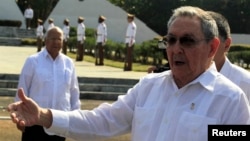HAVANA —
Cuban President Raul Castro, who is expected to begin a second five-year term on Sunday, jokingly told reporters on Friday that he was planning his retirement but left open just when he would step down.
"I'm going to retire," said a grinning Castro in the company of visiting Russian Prime Minister Dmitry Medvedev.
Castro urged reporters to pay close attention to the National Assembly meeting this weekend, when a Council of State and president will be elected.
"I'm going to turn 82, I have a right to retire already," Castro said. "You don't believe me? Why are you so incredulous?" he added in an exchange with reporters as he visited a monument to fallen Soviet soldiers.
"It will be an interesting speech. Pay attention," Castro said before leaving with Medvedev.
Castro, who replaced his ailing brother Fidel in 2008 and turns 82 in June, has in recent years repeatedly stated that Communist Party and government leaders should be held to two, five-year terms in office.
Castro would begin his second term on Sunday, which would theoretically leave him free to retire in 2018, aged 86.
During his first term, Castro has presided over a reform process that included the gradual loosening of restrictions on travel and personal property while moving the economy in a more market-friendly direction.
He has said it is the responsibility of those who built the 54-year-old revolution to see the reforms through and leave Cuba in better condition for a new generation of leaders.
Castro, despite his age, appears fit and lucid and is widely expected by foreign experts, diplomats and Cubans to serve a second term.
"Whether it happens now or after a second term, there's no shame in putting the limits of Raul Castro's presidential tenure on the table," said Julia Sweig, director of Latin America studies at the Council on Foreign Relations, a U.S. think tank.
"I see this as very consistent with his style - but I would be surprised if this Sunday's speech would indicate he won't stand for a second term," Sweig said.
"I'm going to retire," said a grinning Castro in the company of visiting Russian Prime Minister Dmitry Medvedev.
Castro urged reporters to pay close attention to the National Assembly meeting this weekend, when a Council of State and president will be elected.
"I'm going to turn 82, I have a right to retire already," Castro said. "You don't believe me? Why are you so incredulous?" he added in an exchange with reporters as he visited a monument to fallen Soviet soldiers.
"It will be an interesting speech. Pay attention," Castro said before leaving with Medvedev.
Castro, who replaced his ailing brother Fidel in 2008 and turns 82 in June, has in recent years repeatedly stated that Communist Party and government leaders should be held to two, five-year terms in office.
Castro would begin his second term on Sunday, which would theoretically leave him free to retire in 2018, aged 86.
During his first term, Castro has presided over a reform process that included the gradual loosening of restrictions on travel and personal property while moving the economy in a more market-friendly direction.
He has said it is the responsibility of those who built the 54-year-old revolution to see the reforms through and leave Cuba in better condition for a new generation of leaders.
Castro, despite his age, appears fit and lucid and is widely expected by foreign experts, diplomats and Cubans to serve a second term.
"Whether it happens now or after a second term, there's no shame in putting the limits of Raul Castro's presidential tenure on the table," said Julia Sweig, director of Latin America studies at the Council on Foreign Relations, a U.S. think tank.
"I see this as very consistent with his style - but I would be surprised if this Sunday's speech would indicate he won't stand for a second term," Sweig said.










